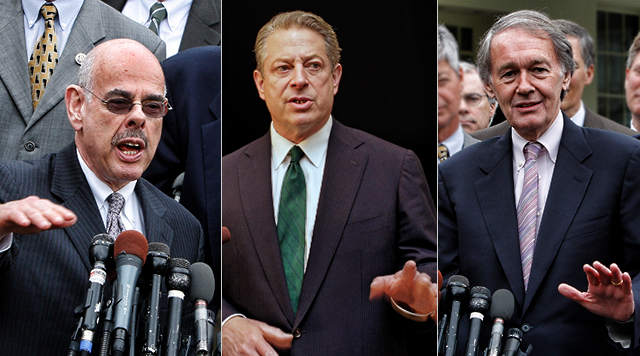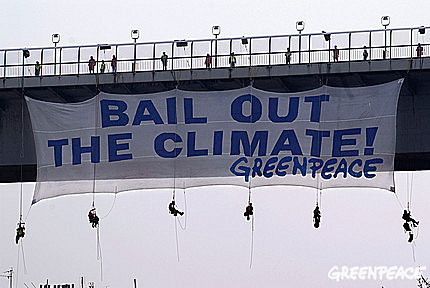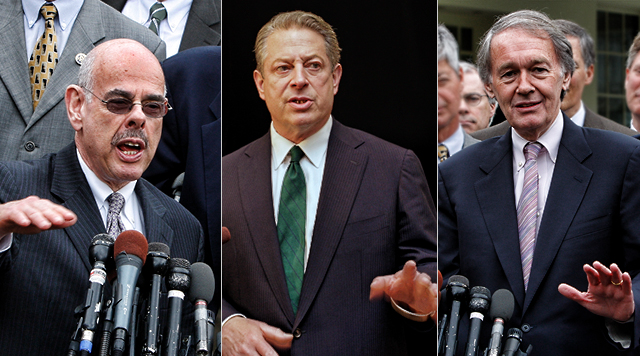 The climate dream team? Rep. Henry Waxman, former VP Al Gore and Rep. Ed Markey are set on getting a cap-and-trade climate bill passed ASAP.AP photos / composite by Tom Twigg
The climate dream team? Rep. Henry Waxman, former VP Al Gore and Rep. Ed Markey are set on getting a cap-and-trade climate bill passed ASAP.AP photos / composite by Tom Twigg
NASHVILLE, Tenn. — Al Gore on Thursday kicked off a new phase of his campaign against climate change, calling on his volunteers across the country to rally behind the climate and energy bill now moving through the House.
In an interview here, Gore offered high praise for the compromise worked out between bill coauthors Henry Waxman (D-Calif.) and Ed Markey (D-Mass.) and moderate Democrats. “They’re on the verge of a truly historic accomplishment,” said Gore.
Gore spoke with Grist ahead of the first North American summit of The Climate Project, the international campaign he founded to train citizens to present the climate slideshow he made famous in An Inconvenient Truth. Up to this point, Climate Project presenters have focused on educating the public about the science of global warming. The meeting this weekend will give presenters updated information and a new, more activist mission: helping to pass the House climate bill. Gore wants the network of volunteers to “become citizen activists in support of this legislation.”
While some in the environmental community have expressed disappointment in the Waxman-Markey bill, Gore was optimistic.
“I think they’ve maintained the integrity of the bill,” he said. “In its current form as I understand it, I have no doubt that it will accomplish the result we need to begin this transition toward renewable energy, conservation, efficiency, and renewed U.S. leadership in global negotiations.”
Gore praised Waxman’s and Markey’s efforts to reach compromise, which addressed the concerns of moderate Democrats from the South and Midwest. “One cannot discount the importance of having a broad base of support for this legislation,” he said. “Were it to be perceived as unbalanced regionally, unduly harsh in its impact on important sectors of the economy, then its chances for passage in the House and Senate would be sharply diminished.”
Though the near-term emissions target in the current bill is lower than in the original draft, Gore said he believes it’s a good starting point. It calls for a 17 percent cut below 2005 levels by 2020, but Gore predicts that the other provisions in the bill — like requiring 15 to 20 percent of electricity to come from renewable sources by 2020 — will lead to much larger emissions reductions.
“The key role of the legislation is to begin that shift [to lower emissions],” he said. “Once it begins, it will be unstoppable.”
The road to Copenhagen
Gore praised President Obama’s leadership on climate and energy thus far. He called Obama’s meeting with Democrats on the Energy and Commerce Committee last week “very timely and very successful,” coming at a “moment where the negotiations really could have gone either way.”
“He’s got as good a team in the White House and the Cabinet as this country has ever seen, and I think he’s going about it in a very skillful way,” said Gore.
Gore predicted that the president will continue to be engaged in the process, and will want to go to the international summit in Copenhagen in December where a new global climate treaty will be hashed out.
Gore said the Waxman-Markey legislation could be revisited and strengthened over time as the world community comes to recognize the value of emissions reductions. He drew a comparison with the 1997 Montreal Protocol, which sought to limit substances that deplete the ozone layer. The first targets in that treaty were weaker than many wanted, but within three years, world leaders strengthened the pact, after realizing it wasn’t hurting the global economy.
“I think this bill is likely to play the same role,” said Gore. “Whatever agreement is reached in Copenhagen, if it mirrors the kind of approach in this bill, it will begin a shift that will pick up momentum as it develops and the world will quickly revisit it.”
Lessons learned
A veteran of the House, Senate, and White House, Gore says he’s learned a lot over the years about political compromise and what’s needed to pass strong legislation. He lived through the brutal fight over the BTU tax that the Clinton administration backed in 1993, which would have been a first step toward reducing carbon dioxide emissions.
The House passed a budget bill with the BTU tax in it without any Republican support, but it was later dropped in order to get the overall budget plan through the Senate. Republicans then bashed Democrats who had voted for the tax, using the issue effectively in the 1994 elections, which resulted in the first GOP House majority in 40 years. Republicans this year are banking on using the climate bill the same way, putting pressure on freshmen Democrats and those in vulnerable seats.
Gore said he learned from the BTU fight that there needs to be a strong, grassroots call for action from citizens across the country.
“In order to win this struggle, we have to go to the constituents of the Congress,” said Gore. “Just laying the facts on the table and playing an inside-the-Beltway game is not going to do it on this issue. We have to win the feelings and opinions of voters in the country as a whole … We have to go to the grassroots.”
As for legislators who are not yet on board, he said, “The only way they’re going to face down the special interests is if they hear from their constituents that this is the right thing to do.”
And Gore is making sure they will hear from their constituents.
The Climate Project and its partner organization, the Alliance for Climate Protection, are now “multi-hundred-million-dollar” campaigns “aimed at getting the facts before the people,” he said. Gore formed both groups in 2006, but until now their work has been largely separate. The Climate Project and its 1,200 slideshow presenters have focused on educating the public, while the Alliance for Climate Protection has concentrated on major advertising campaigns.
The two groups are now entering a new phase with a more coordinated, campaign-like focus of generating nationwide grassroots support for a climate bill. Since the beginning of this year, the Alliance has grown from 20 staffers to 120, working not just in Washington, D.C., but in key congressional districts across the country. Together, the two groups are using slideshow presentations, action alerts to supporters, and radio, print, and television ads to help get a climate bill passed. (We’ll have more on their efforts soon.)
“We have a big ally: reality,” said Gore. “But that doesn’t always determine the outcome unless you have a focused message.”
Gore’s two groups are also cooperating with other environmental organizations to make sure activists are targeting lawmakers, and they’re working with allies in the labor and religious communities. “We’re coordinating our work effort in a way that I’ve never seen before in the environmental movement,” he said.
The eventual goal of the Alliance for Climate Protection, according to Gore, is to put itself out of business by the end of 2009. If the U.S. passes a strong climate bill and Copenhagen produces a strong climate treaty, the group will dissolve and redirect its resources in new ways, Gore said. “We’re a time-limited organization, have been from the start,” said Gore.
“Our goal is to get the country and the world past the tipping point beyond which the majority say, ‘OK, we’re going to do this.'”




